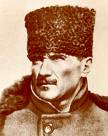 My recent reading matter, apart from the usual EU nonsense and various detective stories, has been Margaret Macmillan’s superb account of the Versailles and various other treaties signed – willingly by some and not so willingly by others – in the immediate aftermath of the First World War.
My recent reading matter, apart from the usual EU nonsense and various detective stories, has been Margaret Macmillan’s superb account of the Versailles and various other treaties signed – willingly by some and not so willingly by others – in the immediate aftermath of the First World War.Towards the end of the book there is an enthralling account (better than most detective stories and all so-called thrillers) of the attempts to divide up Turkey after it had discarded the Ottoman Empire and Kemal Ataturk’s successful way of dealing with it. This did include a terrifying number of casualties and the complete destruction of Greek and Armenian Smyrna. Would it have happened if the victorious allies had not egged the Greeks and the Armenians on to take huge bites out of Turkish territory? Or if they had not decided to station troops in various parts of the country, including Constantinople, shortly therafter to be renamed Istanbul?
Some of those erstwhile allies still think of Turkey as of a country of no importance, except when the possibility of it joining the EU arises. Then, all of a sudden, the country becomes incredibly big and important with far too many people for us to accommodate (which is probably true). On the other hand, let’s face it, if the EU does want to have an army of its own, it will have to take Turkey in. What other country will provide an adequate number of soldiers? And, incidentally, those soldiers are not ragamuffin poverty-stricken peasants carrying rusty old shotguns. It is a well-trained, well-armed, well-equipped military force, highly regarded by many British officers who have had dealings with NATO troops.
We reported not long ago that around the same time as the Turkish writer Orhan Pamuk received the Nobel Prize, a Bill passed the Assemblée Nationale, though not yet the Senate, which said that it would be illegal to deny that the 1915 Armenian massacres amounted to a genocide.
One can see the reasoning behind this piece of legislation. Firstly, as we know, Turkey is of little importance in the world and the overweening Europeans, particularly French can pass any legislation they like about that country.
Secondly, as we also know, Turkey is a huge country with an enormous population and it is, therefore, of enormous importance to make sure that there will be no question of it ever joining the EU. If we concentrate on the subject of the Armenian massacres that will prove that Turkey, in no sense a Francophile country, is not good enough for this wondrously free and democratic Union. (It is a matter of little consequence that, what with the war in Algiers, the assassination and bombing of targets in numerous countries, including West Germany and the near civil war immediately after 1962, France would not have become member of the EU under those conditions either.)
The Turks threatened retaliation and the first segment has come.
General Ilker Basbug, the land forces commander, was quoted on Wednesday by state-owned Anatolia news agency as saying in Ankara: "Relations with France in the military field have been suspended."Several French firms who have supplied Turkey with weaponry have also been blacklisted and, as my colleague has pointed out, for possibly separate reasons, the Turks have been buying American weaponry.
Well, it is a relief to know that the sophisticated French neither act nor are viewed in the same way as those boorish, arrogant Yanks who trample over other countries’ sensitivities.
The French government is not too happy about the legislation. Possibly, it is coming under pressure from arms manufacturers. But there is not much it can do, having allowed its supporters a free vote in the Assemblée.
If I were the French government and legislators I would spare some thought to Kemal Ataturk and the events of 1920 – 22.
COMMENT THREAD
